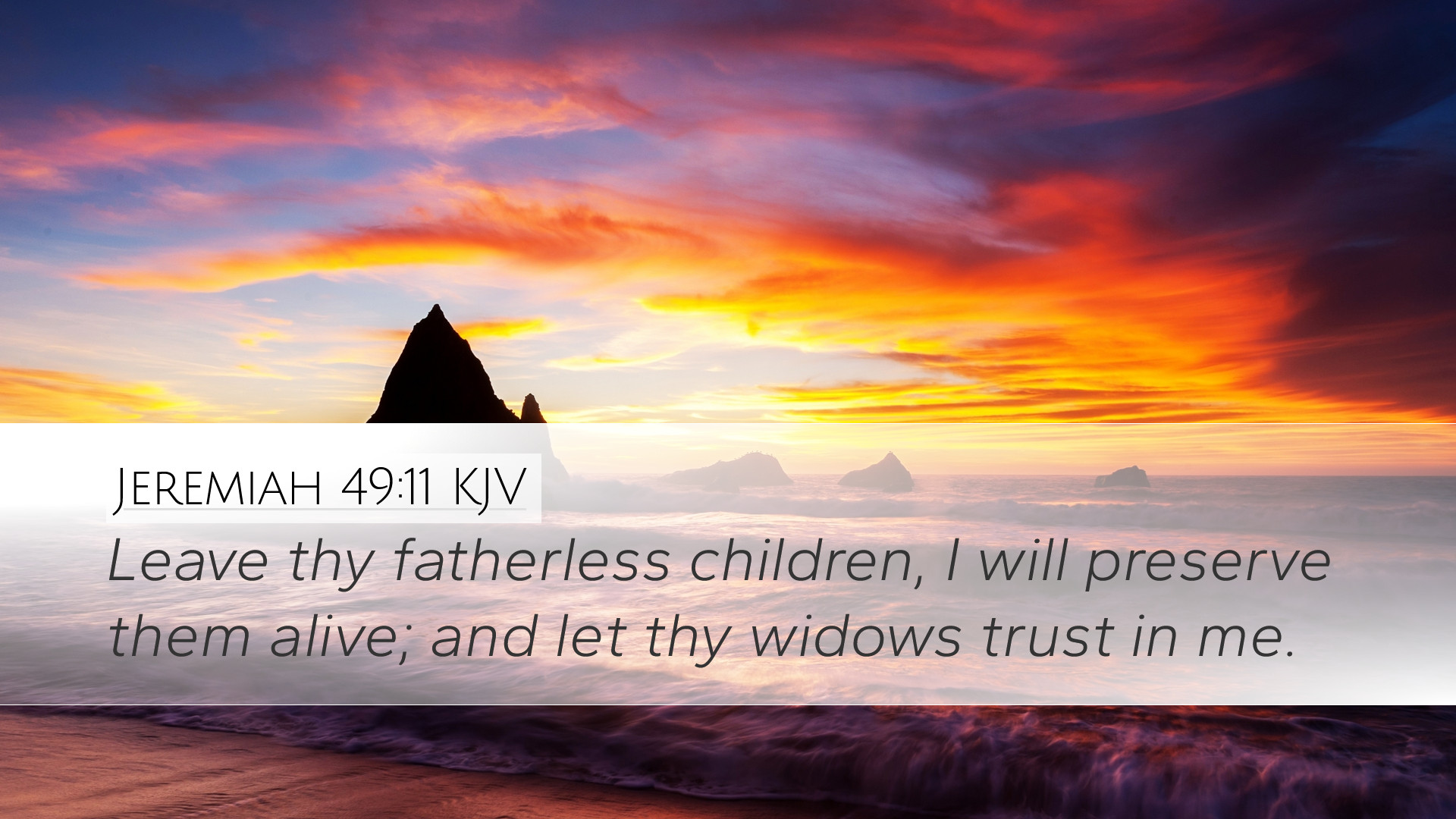Commentary on Jeremiah 49:11
Verse Context: Jeremiah 49:11 states, "Leave thy fatherless children; I will preserve them alive; and let thy widows trust in me." This verse comes within a larger prophetic oracle against the nation of Edom, highlighting God's promises amid judgment.
Analysis of Key Themes
-
God's Care for the Vulnerable:
Jeremiah through this verse expresses profound concern for the fatherless and widows, critical figures in ancient Near Eastern society often subject to neglect and exploitation. Here, we see God's active preservation of the vulnerable, emphasizing His covenantal loyalty and compassion.
-
Judgment and Promise:
While the preceding chapters of Jeremiah focus on the coming judgment on Edom due to its pride and violence, this verse offers a glimmer of hope. God reassures the oppressed that, despite the calamities that may ensue from judgment, He will safeguard the helpless. This duality of judgment and mercy is a pervasive theme throughout the book of Jeremiah.
-
Trust in Divine Providence:
The directive for widows to trust in God showcases a profound theological principle about reliance on God's providence. It calls for an active faith amidst distress, a theme that resonates throughout Scripture as believers are encouraged to find refuge in God during trials.
Insights from Public Domain Commentaries
Matthew Henry’s Commentary
Henry comments on the merciful aspect of God's character, noting that despite impending destruction upon Edom and the loss experienced by its people, God assures the helpless that He will take responsibility for them. He emphasizes that while Edom’s judgment is deserved, God’s grace extends to those in need. This principle reflects the overarching nature of God’s justice tempered with mercy.
Albert Barnes’ Commentary
Barnes elaborates on the identity of the “fatherless” as symbolic of those who experience abandonment and lack protection. He asserts that divine protection is not merely a physical one but a spiritual safeguard that allows for endurance in trials. The reference to widows evokes a deep emotional response and calls attention to the societal structures where the vulnerable are often overlooked. Barnes underscores the promise that God will uphold their dignity even in dire circumstances, displaying His omnipotence and fidelity.
Adam Clarke’s Commentary
Clarke provides additional insight into the cultural context, outlining how widows and orphans were often left destitute and considered the most powerless in society. He notes that God’s directive to Edom to leave these groups untouched is significant; it relays a clear message concerning the ethical obligations even amidst warfare and chaos. Clarke further suggests that this verse is a declaration of divine advocacy for justice, indicating that God's concern transcends human conflicts.
Theological Reflections
This scripture calls for deep theological reflection on God’s character as protector and sustainer. For theologians and pastoral leaders, it serves as a reminder of the church's obligation to care for the marginalized. Ecclesiastical communities are urged to model God’s concern for the fatherless and widows, leading initiatives aimed at social justice and providing for those who cannot fend for themselves.
Practical Applications
-
Empathy and Action:
For pastors and church leaders, this text challenges us to actively empathize with the marginalized in our communities. It calls for tangible actions that showcase the love of Christ, encouraging congregations to engage in service opportunities that specifically target vulnerable populations.
-
Faith Amidst Struggles:
Bible scholars are reminded of the need to cultivate a resilient faith that mirrors the trust given to God as depicted in this verse. In facing adversity, it is imperative for believers to rely on God's promises of preservation and care.
-
Justice-Oriented Ministry:
Springing from this scripture, church ministries should prioritize justice-oriented programs. Whether feeding the hungry, supporting single mothers, or advocating for social justice, believers are called to reflect the heart of God for the vulnerable.
Conclusion
Jeremiah 49:11 offers profound insights into God’s character as a protector and advocate for the vulnerable. Through prophetic judgment, He extends promises of mercy, urging His people to embody His compassion. This verse serves as a critical touchstone for pastors, theologians, and scholars alike, demanding a reflection on God’s justice and the church's response to societal needs. In being faithful to such scripture, the church can fulfill its role as a beacon of hope for the fatherless and disenfranchised in today's world.


